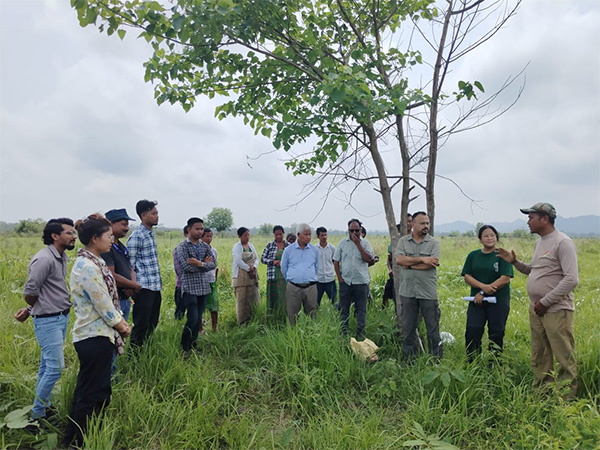Guwahati (Assam) [India], May 25 (ANI): Aaranyak is undertaking a large-scale plantation drive in Assam to address human-elephant conflict by restoring degraded habitats and providing elephants with natural food sources.
The goal is to replenish 100 hectares of degraded forest by planting one lakh saplings of native species, improving ecological connectivity for wildlife, particularly elephants, and mitigating human-elephant conflict (HEC).
Aaranyak is supported by the SBI Foundation and is a part of the Dhansiri-Sikaridanga Joint Forest Management Committee (JFMC) is undertaking a massive plantation drive in the Bhairabkunda Reserve Forest along the Indo-Bhutan border in Assam’s Udalguri district.
The plantation drive, now in its third year, has seen the participation of forest officials, FXB India Suraksha, the Bhairabkunda Development Committee, and the Dhansiri-Sikaridanga Joint Forest Management Committee.
On the first day of the third-year plantation drive, 510 saplings of 11 native species were planted, including Outenga, Bel, Kola Siris, Gamari, Bhatgila, Amla, Jamun, Bhomora, Xilikha, Bhelkor, Kum, Odal, and Tora.
The objective of the plantation drive is to promote human-elephant coexistence by securing elephant habitats, facilitating elephant movement, and sustaining the watershed for the region.
Habitat replenishment can have a lasting impact in favor of mitigating HEC, providing a long-term solution to reduce conflicts between humans and elephants.
“The Aaranyak team is striving for habitat improvement and restoring degraded areas under the project to secure elephant habitat, facilitate elephant movement for long-term mitigation of human-elephant confrontation, and sustain the watershed for the region,” said Dr Bibhuti Prasad Lahkar, a senior conservation scientist in Aaranyak.
“Raging HEC undermines efforts for conservation of elephants and their habitat, besides affecting the well-being of people. The complex issue of HEC mitigation requires a multi-pronged and multi-stakeholders approach as has been adopted by research-driven Aaranyak,” said Dr Alolika Sinha, a senior conservation biologist in Aaranyak. (ANI)
Disclaimer: This story is auto-generated from a syndicated feed of ANI; only the image & headline may have been reworked by News Services Division of World News Network Inc Ltd and Palghar News and Pune News and World News
HINDI, MARATHI, GUJARATI, TAMIL, TELUGU, BENGALI, KANNADA, ORIYA, PUNJABI, URDU, MALAYALAM
For more details and packages












